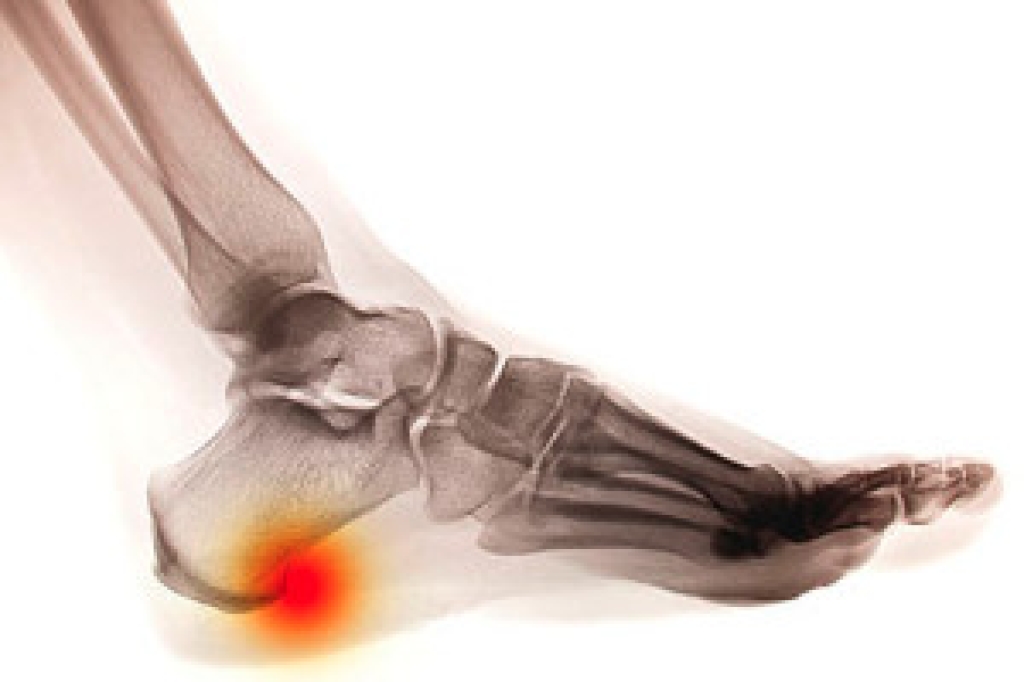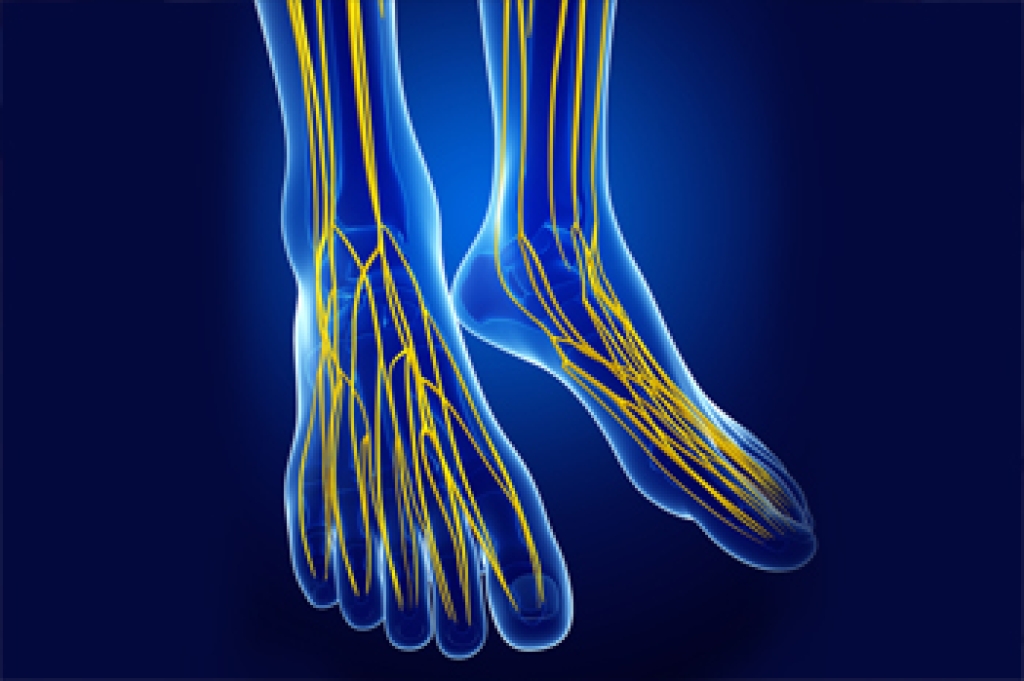Connect With Us
Blog
Blog
Should I See a Doctor for My Heel Pain?
 Heel pain is one of the most common conditions podiatrists help treat, and it can have a variety of causes. Common causes of heel pain include plantar fasciitis, Achilles tendonitis, bursitis, a ruptured Achilles tendon, or a heel fracture. There are a few key signs that your heel pain may be serious and needs to be checked by a podiatrist. If the pain continually worsens, stops you from doing daily activities, has not improved after a couple of weeks, or causes a tingling sensation in the heel, there may be a more serious issue at play that should be checked by a podiatrist. If the pain is severe, hinders your ability to walk, or was accompanied by a popping sensation at the time of injury, these may be signs of an even more serious injury that should be treated immediately.
Heel pain is one of the most common conditions podiatrists help treat, and it can have a variety of causes. Common causes of heel pain include plantar fasciitis, Achilles tendonitis, bursitis, a ruptured Achilles tendon, or a heel fracture. There are a few key signs that your heel pain may be serious and needs to be checked by a podiatrist. If the pain continually worsens, stops you from doing daily activities, has not improved after a couple of weeks, or causes a tingling sensation in the heel, there may be a more serious issue at play that should be checked by a podiatrist. If the pain is severe, hinders your ability to walk, or was accompanied by a popping sensation at the time of injury, these may be signs of an even more serious injury that should be treated immediately.
Many people suffer from bouts of heel pain. For more information, contact one of our podiatrists of APEX Foot & Ankle Center. Our doctors can provide the care you need to keep you pain-free and on your feet.
Causes of Heel Pain
Heel pain is often associated with plantar fasciitis. The plantar fascia is a band of tissues that extends along the bottom of the foot. A rip or tear in this ligament can cause inflammation of the tissue.
Achilles tendonitis is another cause of heel pain. Inflammation of the Achilles tendon will cause pain from fractures and muscle tearing. Lack of flexibility is also another symptom.
Heel spurs are another cause of pain. When the tissues of the plantar fascia undergo a great deal of stress, it can lead to ligament separation from the heel bone, causing heel spurs.
Why Might Heel Pain Occur?
- Wearing ill-fitting shoes
- Wearing non-supportive shoes
- Weight change
- Excessive running
Treatments
Heel pain should be treated as soon as possible for immediate results. Keeping your feet in a stress-free environment will help. If you suffer from Achilles tendonitis or plantar fasciitis, applying ice will reduce the swelling. Stretching before an exercise like running will help the muscles. Using all these tips will help make heel pain a condition of the past.
If you have any questions, please feel free to contact our offices located in Fort Myers, Shellpoint, and Naples, FL . We offer the newest diagnostic and treatment technologies for all your foot care needs.
Posterior Tibial Nerve Neuralgia
Posterior tibial nerve neuralgia, also known as tarsal tunnel syndrome, is a nerve disorder that is caused by compression of the posterior tibial nerve. This nerve runs through the tarsal tunnel, an area along the inside of the ankle that houses nerves, blood vessels, and tendons. When the posterior tibial nerve is compressed, it causes symptoms such as foot, ankle, and toe pain, a pins and needles sensation in the foot, and numbness. Conservative treatments such as resting and icing the foot, wearing orthotics, and taking pain medications can help relieve symptoms. For more information about tarsal tunnel syndrome and to discover the best course of treatment for you, please consult with a podiatrist.
Tarsal tunnel syndrome can be very uncomfortable to live with. If you are experiencing tarsal tunnel syndrome, contact one of our podiatrists of APEX Foot & Ankle Center. Our doctors can provide the care you need to keep you pain-free and on your feet.
Tarsal Tunnel Syndrome
Tarsal tunnel syndrome, which can also be called tibial nerve dysfunction, is an uncommon condition of misfiring peripheral nerves in the foot. The tibial nerve is the peripheral nerve in the leg responsible for sensation and movement of the foot and calf muscles. In tarsal tunnel syndrome, the tibial nerve is damaged, causing problems with movement and feeling in the foot of the affected leg.
Common Cause of Tarsal Tunnel Syndrome
- Involves pressure or an injury, direct pressure on the tibial nerve for an extended period of time, sometimes caused by other body structures close by or near the knee.
- Diseases that damage nerves, including diabetes, may cause tarsal tunnel syndrome.
- At times, tarsal tunnel syndrome can appear without an obvious cause in some cases.
The Effects of Tarsal Tunnel Syndrome
- Different sensations, an afflicted person may experience pain, tingling, burning or other unusual sensations in the foot of the affected leg.
- The foot muscles, toes and ankle become weaker, and curling your toes or flexing your foot can become difficult.
- If condition worsens, infections and ulcers may develop on the foot that is experiencing the syndrome.
A physical exam of the leg can help identify the presence of tarsal tunnel syndrome. Medical tests, such as a nerve biopsy, are also used to diagnose the condition. Patients may receive physical therapy and prescriptive medication. In extreme cases, some may require surgery.
If you have any questions please contact our offices located in Fort Myers, Shellpoint, and Naples, FL . We offer the newest diagnostic and treatment technologies for all your foot and ankle needs.
What Causes Heel Spurs?
 Heel spurs can form when calcium deposits create bony protrusions on the heel bone. Over time, these deposits develop due to issues such as arthritis or inflammation of the Achilles tendon (known as Achilles tendonitis) or the plantar fascia (known as plantar fasciitis). In fact, plantar fasciitis, which occurs when there is inflammation in tissues running along the bottom of the foot, is the most common issue that causes heel spurs, leading to roughly half of all cases. Common signs of heel spurs may include pain, tenderness, swelling, and difficulty walking. There can be a variety of different causes as to why you may be struggling with heel pain. Therefore, consulting with a podiatrist for a proper diagnosis and treatment method is suggested.
Heel spurs can form when calcium deposits create bony protrusions on the heel bone. Over time, these deposits develop due to issues such as arthritis or inflammation of the Achilles tendon (known as Achilles tendonitis) or the plantar fascia (known as plantar fasciitis). In fact, plantar fasciitis, which occurs when there is inflammation in tissues running along the bottom of the foot, is the most common issue that causes heel spurs, leading to roughly half of all cases. Common signs of heel spurs may include pain, tenderness, swelling, and difficulty walking. There can be a variety of different causes as to why you may be struggling with heel pain. Therefore, consulting with a podiatrist for a proper diagnosis and treatment method is suggested.
Heel spurs can be incredibly painful and sometimes may make you unable to participate in physical activities. To get medical care for your heel spurs, contact one of our podiatrists from APEX Foot & Ankle Center. Our doctors will do everything possible to treat your condition.
Heels Spurs
Heel spurs are formed by calcium deposits on the back of the foot where the heel is. This can also be caused by small fragments of bone breaking off one section of the foot, attaching onto the back of the foot. Heel spurs can also be bone growth on the back of the foot and may grow in the direction of the arch of the foot.
Older individuals usually suffer from heel spurs and pain sometimes intensifies with age. One of the main condition's spurs are related to is plantar fasciitis.
Pain
The pain associated with spurs is often because of weight placed on the feet. When someone is walking, their entire weight is concentrated on the feet. Bone spurs then have the tendency to affect other bones and tissues around the foot. As the pain continues, the feet will become tender and sensitive over time.
Treatments
There are many ways to treat heel spurs. If one is suffering from heel spurs in conjunction with pain, there are several methods for healing. Medication, surgery, and herbal care are some options.
If you have any questions, please feel free to contact our offices located in Fort Myers, Shellpoint, and Naples, FL . We offer the newest diagnostic and treatment technologies for all your foot care needs.
What Should I Do if My Child Is Limping?
 Seeing your child have difficulty walking can be alarming. If you’ve noticed your child limping, you should first ask them if they have recently injured their leg or foot or stood on something sharp. Inspect their feet for any blisters, cuts, or wounds. If your child reports an injury and can’t put weight on the affected leg, or if you see a wound, you should seek medical care. If there is no readily apparent cause for the limping, it may be due to an underlying medical condition. There are many health problems that could lead to limping, such as juvenile arthritis. To learn more about what to do if your child is limping, please consult with a podiatrist.
Seeing your child have difficulty walking can be alarming. If you’ve noticed your child limping, you should first ask them if they have recently injured their leg or foot or stood on something sharp. Inspect their feet for any blisters, cuts, or wounds. If your child reports an injury and can’t put weight on the affected leg, or if you see a wound, you should seek medical care. If there is no readily apparent cause for the limping, it may be due to an underlying medical condition. There are many health problems that could lead to limping, such as juvenile arthritis. To learn more about what to do if your child is limping, please consult with a podiatrist.
Making sure that your children maintain good foot health is very important as they grow. If you have any questions, contact one of our podiatrists of APEX Foot & Ankle Center. Our doctors can provide the care you need to keep you pain-free and on your feet.
Keeping Children's Feet Healthy
Having healthy feet during childhood can help prevent medical problems later in life, namely in the back and legs. As children grow, their feet require different types of care. Here are some things to consider...
Although babies do not walk yet, it is still very important to take care of their feet.
Avoid putting tight shoes or socks on his or her feet.
Allow the baby to stretch and kick his or her feet to feel comfortable.
As a toddler, kids are now on the move and begin to develop differently. At this age, toddlers are getting a feel for walking, so don’t be alarmed if your toddler is unsteady or ‘walks funny’.
As your child gets older, it is important to teach them how to take care of their feet.
Show them proper hygiene to prevent infections such as fungus.
Be watchful for any pain or injury.
Have all injuries checked by a doctor as soon as possible.
Comfortable, protective shoes should always be worn, especially at play.
If you have any questions, please feel free to contact our offices located in Fort Myers, Shellpoint, and Naples, FL . We offer the newest diagnostic and treatment technologies for all your foot care needs.
Blog Archives
- 2025
- 2024
- 2023
- 2022
- 2021
- 2020
- 2019
- 2018
- 2017


